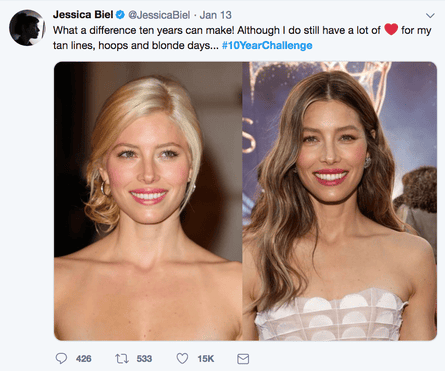Have you done the #10YearChallenge? It’s the latest internet craze and involves posting a picture of yourself from 2009 next to a picture of yourself in 2019. I’m not exactly sure why that’s a challenge, but there you go.
While this may seem like just another silly meme, some have asked whether it could have a more sinister side. Kate O’Neill, a tech journalist, half-jokingly suggested on Twitter that the data could be used to train facial recognition algorithms and make them better at predicting age progression. Her tweet went viral and theories started to swirl that perhaps the trend wasn’t so much a challenge, but a conspiracy, executed by Facebook. It wouldn’t be the first time that data collection has been disguised as an innocuous social game. Cambridge Analytica covertly used a personality quiz to get insights into people’s political leanings.

Facebook has said these theories are nonsense. “This is a user-generated meme that went viral on its own,” a spokesperson told Wired magazine. “Facebook did not start this trend, and the meme uses photos that already exist on Facebook. Facebook gains nothing from this meme.”
While I don’t really believe Facebook engineered the challenge, I also don’t buy the idea that it gains nothing from the challenge. As Wired points out, while Facebook may have access to our time-stamped photos, the #10YearChallenge sorts them into a far more manageable dataset. It’s not unthinkable to imagine an enterprising Facebook engineer might decide to tinker with it. After all, the company tried to influence people’s emotions, without their knowing, by manipulating the content it showed them.
In its statement to Wired, Facebook also skirted around the fact its algorithms have long been analysing our faces: if you have facial recognition turned on in your settings, Facebook has boiled your face down into a unique number or “template” that allows it to quickly recognise you in photos and videos. This, it has explained, means it can provide useful services such as alerting you if someone else is pretending to be you. What it is slightly quieter about is that while facial recognition provides many benefits, it is also a Pandora’s box of privacy issues. Facebook is far from being from the only company using facial recognition technology – it’s much more pervasive than many people realise. There’s a decent chance, for example, that when you’re in a shop you are being captured on video and having your face matched against a database of known shoplifters.
We have become increasingly aware of just how much power tech companies wield. Discomfort has risen over the extent to which our every move, our every facial feature, is being tracked, analysed and monetised. This has spurred calls to hold tech companies to account. That’s important, but we must also hold ourselves to account. The fact that so many people piled into the #10YearChallenge without thinking about the privacy issues is slightly depressing. We are sleepwalking into a surveillance nightmare, handing enormous companies intimate information for likes and shares. So, avoid the #10YearChallenge. Nobody, except maybe your mum, cares what you looked like in 2009. Try the Think About Your Digital Footprint More Carefully Because the World Is Turning Into Black Mirror challenge instead.

